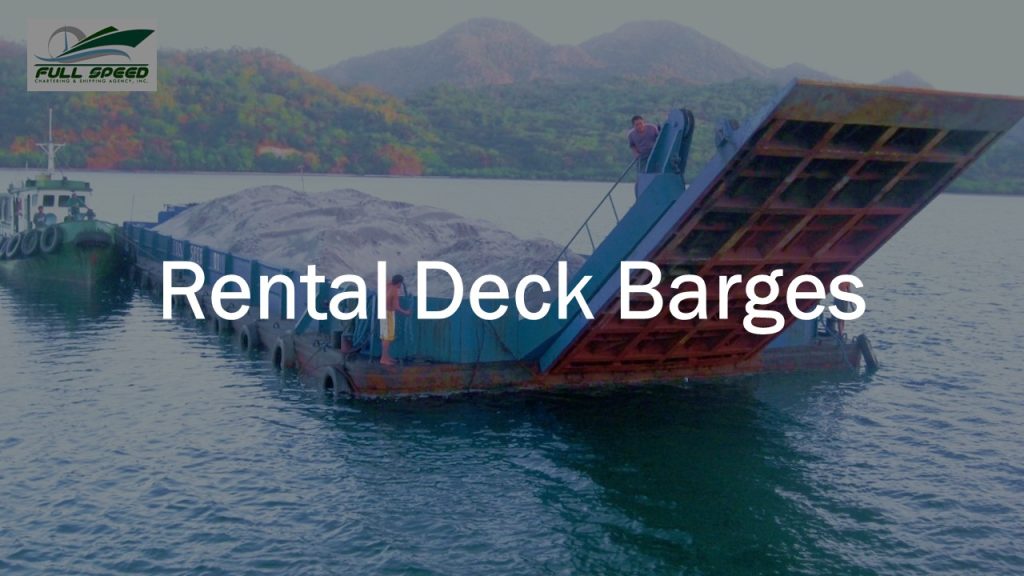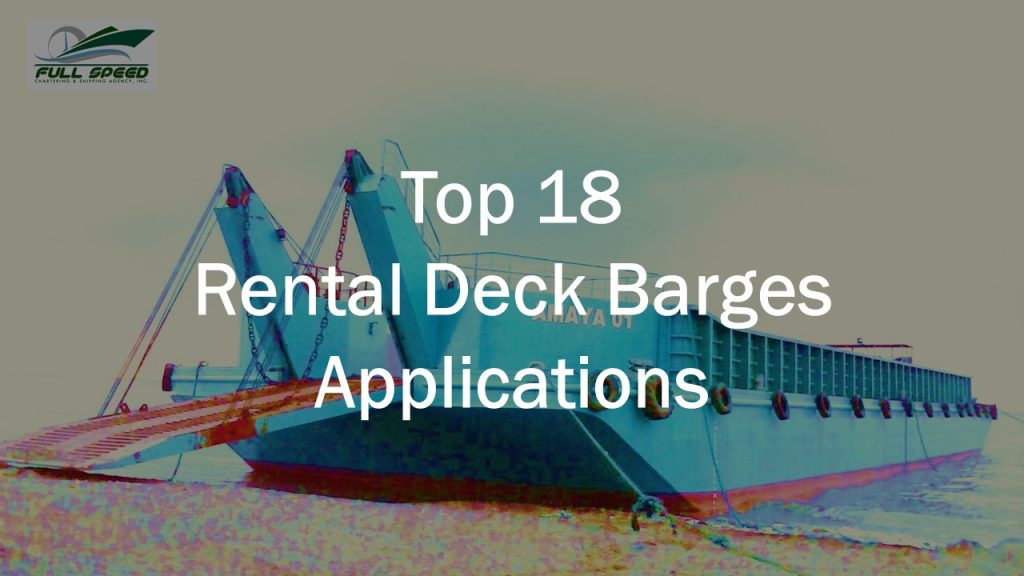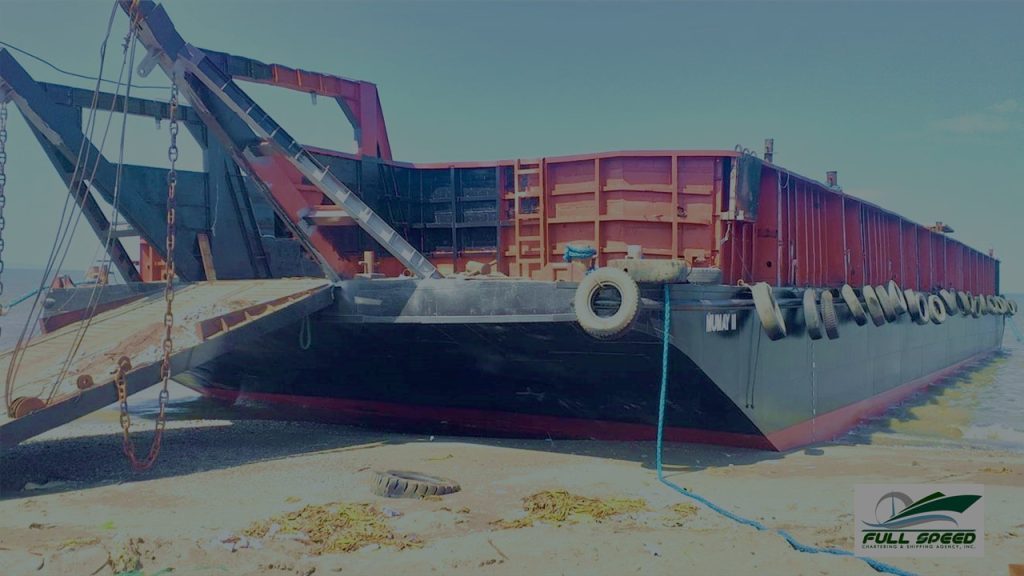Barge and tugboat companies in the Philippines play a crucial role in the transportation industry, quietly but efficiently moving goods along rivers, canals, and sea coastal waterways. While these vessels may not grab headlines like massive container ships or luxury cruise liners, they are the unsung heroes of maritime commerce. Barges serve as floating platforms to transport large quantities of bulk cargo such as coal, grain, and petroleum products. Tugboats, on the other hand, provide the power and maneuverability needed to safely navigate these unwieldy barges through narrow channels and congested harbors. Together, barge and tugboat companies form an essential link in our global supply chain network that keeps economies functioning smoothly. So let’s dive deeper into their operations to understand how they make it all possible.
Click here to view our barge and tugboat rentals and explore the crucial role played by barge and tugboat companies in the Philippines, powering seamless transport connections across islands for commerce to flourish.
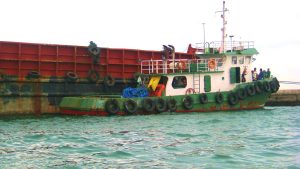
What Are Barge And Tugboat Companies?
Barge and tugboat companies in the Philippines play a crucial role in the maritime industry, supporting various sectors such as transportation, construction, and energy. These companies specialize in providing barges and tugboats for hire or lease, along with skilled personnel to operate them.
Barges are flat-bottomed boats designed for carrying cargo on rivers, canals, and other inland waterways. They have a shallow draft which allows them to navigate through shallow waters easily while carrying significant amounts of weight. Tugboats, on the other hand, are powerful vessels that assist in pushing or towing other boats or barges. They provide the necessary force to navigate through tight spaces like ports or canals.
In the Philippines, barge and tugboat companies are essential players in domestic transportation as they help transport goods across different islands efficiently. Additionally, they are also vital for construction projects along coastlines where access by land may be limited or difficult.
These companies offer a range of services, such as chartering barges for transporting heavy equipment or materials needed for infrastructure development. They also provide assistance during offshore operations, such as drilling activities, by towing drilling rigs into position.
Furthermore, barge and tugboat companies contribute significantly to the renewable energy sector by assisting with offshore wind farms’ installation and maintenance. Their specialized vessels enable the safe transportation of large components like wind turbines to their designated locations at sea.
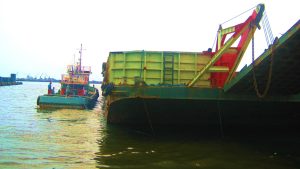
Role Of Barge Companies: Transportation Of Goods Via Waterways
Barge companies in the Philippines play a vital role in the transportation of goods via waterways, particularly in countries like the Philippines, where there are various islands and coastal areas. These companies offer an efficient and cost-effective solution for transporting goods from one place to another, helping in the growth of industries and trade. Barges provide a versatile mode of transport as they can navigate shallow waters that other vessels may find challenging, allowing for easy access to remote locations with limited infrastructure.
One significant advantage of barge transportation is its contribution to reducing road congestion and carbon emissions. Waterways act as natural highways, allowing barges to transport large quantities of goods without adding to road traffic or noise pollution. This makes barge transportation a sustainable alternative that supports environmental goals by minimizing the impact on land resources.
Moreover, barge companies often possess extensive local knowledge about water routes, port procedures, and weather conditions. This expertise enables them to provide reliable services while ensuring timely delivery and minimizing risks associated with navigation challenges or adverse weather conditions. Moreover, these companies offer tailored solutions for specific industries, such as agriculture or construction, by providing necessary equipment like cranes or floating platforms.
In conclusion, barge companies play a crucial role in facilitating efficient and eco-friendly transportation of goods through waterways. Their ability to navigate shallow waters combined with their contribution towards reducing road congestion makes them invaluable in connecting remote areas easily accessible for trade and supporting economic growth while minimizing environmental impact.
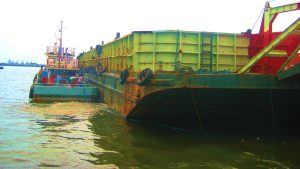
Role Of Tugboat Companies: Assisting In The Movement Of Barges And Other Vessels
Tugboat companies in the Philippines play a crucial role in the maritime industry by assisting in the movement of barges and other vessels. These powerful, compact boats are specifically designed to provide assistance and maneuverability in tight spaces, making them essential when it comes to navigating crowded waterways or docking large ships. Without these specialized tugboats, the transportation of goods via barges and other vessels would be much more challenging and time-consuming.
One key aspect of tugboat companies is their expertise in providing precise and controlled movements. Tugboats are equipped with powerful engines that generate significant amounts of thrust, allowing them to push or pull large vessels with ease. This ability ensures that cargo ships can safely navigate through narrow channels or harbor areas without causing any damage. Furthermore, tugboat operators are highly trained professionals who understand the intricacies of different maneuvers, including line-handling techniques and strategies for effectively utilizing thrusters.
Moreover, tugboat companies in Metro Manila and Cavite also contribute to ensuring the reliability and efficiency of logistics operations. By working alongside barge operators, they help streamline the transportation process by facilitating smooth transitions between land and water transport. This collaboration allows for a seamless transfer of goods from ports to inland locations, supporting economic activities within the region as well as international trade routes passing through Philippine waters.
Tugboat companies play an indispensable role in the movement of barges and other vessels in the Philippines. Their expertise helps ensure safe navigation through crowded waters while maintaining efficient logistics operations vital for regional economies.
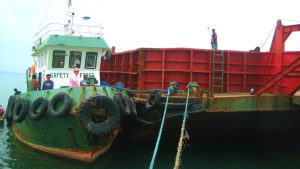
Why Do We Pair a Barge and Tugboat in Marine Operations?
Pairing a barge and tugboat in the Philippines is a common practice in marine operations for several reasons. Firstly, the barge, which is essentially a floating platform, lacks propulsion capabilities of its own. By attaching it to a powerful tugboat, it ensures that the barge can be easily maneuvered and transported, especially in areas with strong currents or limited navigation space.
Secondly, the use of both a barge and tugboat allows for increased efficiency and cost-effectiveness. The tugboat provides the necessary propulsion power to move the barge quickly and efficiently between ports or along waterways. This pairing enables transport companies to maximize their cargo-carrying capacity as a single tugboat can tow several barges at once.
Moreover, the coupling of a barge and tugboat offers enhanced safety during marine operations. Tugboats are specifically designed for towing heavy loads and have advanced navigational systems that make them ideal companions for barges. This joint operation ensures greater stability and control over the movement of goods or materials being transported on board the barge.
Pairing a barge with a tugboat brings numerous advantages to marine operations. From enabling easier navigation in challenging conditions to increasing efficiency and safety measures, this combination proves essential for transporting goods via waterways effectively. The synergy between these two vessels demonstrates how collaboration between machinery is crucial in achieving optimal results in maritime industries such as shipping or construction projects involving water transportation.
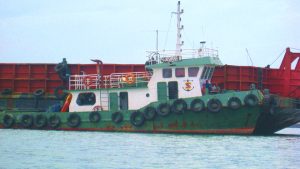
Barge And Tugboat Is An Efficient Transportation Of Goods And Materials
Barge and tugboat transportation in the Philippines is an efficient method of transporting goods and materials, especially in countries like the Philippines, where there are many islands to connect. Unlike traditional shipping methods that rely on large cargo vessels, barges and tugboats offer greater flexibility and maneuverability, allowing for easier access to areas with shallow waters or limited infrastructure.
One of the primary advantages of using barges and tugboats is their ability to transport heavy or oversized cargo. With their strong towing capability, these vessels can move huge volumes of goods that would otherwise be impossible for trucks or trains to handle. This makes them particularly useful for industries such as construction, mining, and oil exploration.
Furthermore, barge and tugboat transportation also offer environmental benefits. These smaller vessels consume less fuel compared to larger cargo ships, resulting in reduced greenhouse gas emissions. Additionally, because they can traverse inland waterways like rivers or estuaries, they reduce the need for long-haul trucking on congested highways. Ultimately, this leads to a significant reduction in traffic congestion and lower road maintenance costs.
Barge and tugboat transportation provide an efficient means of transporting goods and materials, offering flexibility in terms of access to remote areas with limited infrastructure while reducing environmental impacts. Whether it is moving heavy cargo or navigating through narrow waterways, these vessels play a crucial role in facilitating trade within archipelagos like the Philippines while promoting sustainable transportation practices.

Types Of Services Offered By Barge And Tugboat Companies: Towing, Pushing, Docking, And Salvage Operations
Barge and tugboat companies in the Philippines provide a wide range of essential services in the maritime industry. One of the primary services offered by these companies is towing, which involves pulling or hauling barges, ships, or other floating structures using powerful tugboats. Towing is vital for many operations, such as transporting goods between ports or assisting disabled vessels.
In addition to towing, barge and tugboat companies also specialize in pushing operations. Pushing involves using a tugboat to propel barges or other vessels without the need for towing lines. This method is particularly useful when maneuvering in tight spaces or navigating through narrow channels where traditional towing may be challenging.
Moreover, these companies excel in docking services, which involve assisting large ships during the process of berthing at ports and harbors. Tugboats play a crucial role in controlling the speed and direction of incoming ships as they approach their designated docks safely. The skilled crews of barge and tugboat companies ensure that vessels are guided into berths smoothly while avoiding any potential accidents.
Lastly, salvage operations are another critical service offered by barge and tugboat companies. When accidents occur at sea, resulting in vessel grounding or sinking, these companies are often called upon to perform salvage operations. This demanding task requires specialized expertise and equipment to recover sunken vessels, mitigate environmental hazards like oil spills, and restore navigational safety.
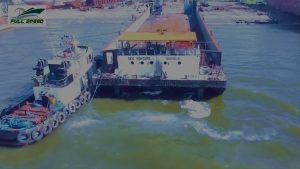
Industries That Rely On Barge And Tugboat Services in the Philippines
Industries that heavily rely on barge and tugboat services play a crucial role in the transport and logistics sector in the Philippines. One such industry is mining. In countries rich with mineral resources like the Philippines, barge and tugboat services are essential for transporting raw materials from mines to processing plants or export terminals. These waterborne vessels are particularly useful in areas with limited road infrastructure, as they can navigate rivers, lakes, and coastal waters with ease.
Another industry that heavily depends on barge and tugboat services in the Philippines is construction. Large-scale building projects often require the transportation of heavy machinery, equipment, and materials such as cement or steel beams. Barges provide an efficient means of transporting these goods to remote construction sites along rivers or coastlines where access by road may be challenging. Furthermore, tugboats are instrumental in towing floating structures such as pontoons or barges used in offshore construction activities.
Additionally, the agriculture industry in Luzon, Visayas, and Mindanao heavily relies on barge and tugboat services for its transportation needs. In countries with significant agricultural production, like the Philippines, these vessels play a vital role in moving crops like rice or corn from farms to processing centers or distribution channels. Their ability to navigate inland waterways provides a cost-effective solution when compared to traditional land-based transportation methods.
Various industries depend on barge and tugboat services due to their versatility and efficiency in moving goods across different types of waterways.
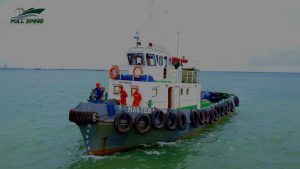
Importance Of Barge And Tugboat Companies In Trade: Efficient Transportation And Cost-effective Solutions
Barge and tugboat companies in Cavite, Subic Bay, Cebu, and Mindoro play a crucial role in facilitating efficient transportation and cost-effective solutions within the trade industry. These companies specialize in providing reliable and flexible transportation of goods and resources by water, particularly for bulk cargoes, heavy machinery, and oversized containers.
One key advantage of using barge and tugboat services is their ability to access inland waterways that are not accessible by larger vessels. This allows for direct transport from factories or warehouses located near rivers or canals to ports or other distribution points. By utilizing these waterways, businesses can significantly reduce the need for long-haul trucking or rail transportation, thereby decreasing congestion on roads and reducing greenhouse gas emissions.
Moreover, barge and tugboat companies often offer more affordable rates compared to traditional shipping methods like container ships. Because barges have lower fuel consumption due to their slower speed and larger carrying capacity, transportation costs are typically lower per unit of cargo. Additionally, they provide greater flexibility in terms of scheduling since they do not rely on standardized international routes that larger vessels follow.
Barge and tugboat companies in the Philippines are vital players in the trade industry as they provide efficient transportation options with cost-effective solutions. Their ability to access inland waterways, coupled with their affordability, makes them an attractive choice for businesses looking to optimize their supply chains while minimizing environmental impact. With increasing demands for sustainable logistics solutions worldwide, barge and tugboat companies will continue to play a significant role in shaping the future of trade operations.
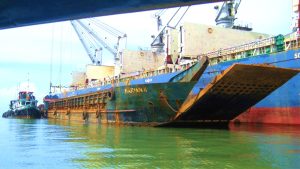
Environmental Benefits Of Barge And Tugboat Transportation In The Philippines
One of the major environmental benefits of utilizing barge and tugboat transportation in the Philippines is the reduction in greenhouse gas emissions. Compared to trucks or trains, which run on diesel fuel, barges and tugboats are powered by more efficient engines that burn cleaner fuels such as natural gas. This significantly reduces the carbon footprint associated with transporting goods, contributing to a cleaner and greener environment.
Additionally, barge and tugboat transportation also help to alleviate traffic congestion on Philippine roads. With its numerous islands and bustling cities like Metro Manila, Cavite, Cebu, Subic, and Cagayan de Oro, the country’s infrastructure often struggles to accommodate heavy truck traffic. Shifting cargo transport onto waterways using barges and tugboats, it eases pressure on congested road networks while reducing harmful vehicle emissions from trucks sitting idle in gridlocked traffic.
Furthermore, utilizing barge and tugboat transportation encourages a shift toward sustainable logistics practices. These vessels have larger carrying capacities compared to trucks or trains, allowing for more goods to be transported in a single trip. This minimizes the need for multiple trips and consequently reduces energy consumption as well as associated pollution levels.
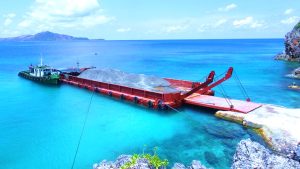
Safety Measures Adopted By Barge And Tugboat Companies: Ensuring Safe Navigation, Equipment Maintenance, And Crew Training
Barge and tugboat companies in the Philippines place safety at the forefront of their operations. These companies ensure safe navigation by implementing strict guidelines for vessel movement, including speed limits and careful monitoring of weather conditions. With busy waterways that are shared with other vessels, such as commercial ships and fishing boats, it is crucial to maintain a high level of awareness to avoid any potential collisions.
Another key aspect of safety measures adopted by barge and tugboat companies is equipment maintenance. Regular inspections are conducted to verify that all navigational aids, communication systems, and machinery are in good working condition. This includes testing the radar system, ensuring proper lighting for night navigation, and inspecting engine performance. By keeping their equipment well-maintained and up-to-date, these companies demonstrate their commitment to ensuring safe operations in Philippine waters.
In addition to prioritizing safe navigation practices and equipment maintenance, barge and tugboat companies in Cavite also invest significantly in crew training programs. Crew members undergo rigorous training courses that cover topics such as emergency procedures, firefighting techniques, medical response training, first aid protocols, and communication skills. Through continuous training programs, these companies not only enhance the capabilities of their crew but also instill a strong safety culture where all individuals understand the importance of following established protocols.
By adopting these safety measures consistently throughout their operations, barge and tugboat companies in the Philippines effectively minimize risks while navigating through busy waterways.
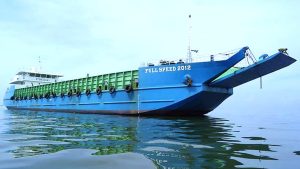
Are You Looking for the Best Barge and Tugboat Company in the Philippines?
If you’re in search of the best barge and tugboat company in the Philippines, look no further than Full Speed Chartering and Shipping Agency, Inc. With their commitment to providing cost-effective solutions and well-maintained vessels, they stand out among their competitors. But what sets them apart from other companies?
- Email us: info@fullspeedchartering.com
- Call our 24-hour hotline: +63 9285081021
- Viber: +63 9285081021
- WhatsApp: +63 9285081021
- Facebook Messenger: Click here
- Click here to inquire
Apart from our high-quality services, Full Speed Chartering and Shipping Agency, Inc. offers a range of advantages that make them an obvious choice for any maritime project. Our team of experienced Filipino professionals ensures that every aspect of your operation is handled with precision and efficiency. Additionally, we prioritize safety measures to ensure a secure working environment for both their crew members and clients.
Not only does Full Speed Chartering and Shipping Agency, Inc. excel in delivering top-notch services, but we also strive to build long-term partnerships with our Filipino clients. They understand the importance of trust in this industry and work hard to earn it by consistently meeting expectations and going above and beyond when required.
If you’re looking for the best barge and tugboat company in the Philippines, choose Full Speed Chartering and Shipping Agency, Inc.
Challenges Faced By Barge And Tugboat Companies In The Philippines
One of the primary challenges faced by barge and tugboat companies in the Philippines is the ever-changing regulatory environment. With strict regulations imposed by both local and international governing bodies, these companies often find themselves struggling to keep up with updates and ensure compliance. This can be particularly challenging for smaller companies that may not have dedicated legal teams or resources to navigate through complex regulations.
Another major challenge for barge and tugboat companies in the Philippines is the inadequate infrastructure and port facilities. Many ports lack sufficient equipment or space to accommodate larger barges and tugboats, leading to delays, congestion, and increased operating costs. Moreover, limited access to berths can hinder efficient operations, especially during peak periods when demand for their services is high.
Moreover, due to frequent tropical storms and typhoons in the region, barge and tugboat companies face significant logistical challenges. Stormy weather conditions can disrupt schedules, delay shipments, damage vessels, and pose risks to crew members’ safety. While some larger companies invest in modern technologies such as advanced navigation systems or weather intelligence tools to mitigate these risks, it remains a constant hurdle that requires careful planning and adaptability.
Barge and tugboat companies in Subic Bay, Navotas, Cebu, Cavite, Manila, and Cagayan de Oro face several formidable challenges, ranging from navigating regulatory complexities to inadequate infrastructure facilities to dealing with unpredictable weather patterns like tropical storms. Overcoming these hurdles necessitates continuous adaptation coupled with an investment of resources into technological advancements while simultaneously advocating for better infrastructure development within ports across the country.
Final Thoughts: Crucial Role of Barge and Tugboat Companies in the Philippine Maritime Transportation Industry
In conclusion, the role of barge and tugboat companies in the Philippine maritime transportation industry cannot be overstated. These companies play a crucial role in facilitating trade and commerce by providing essential services to ships navigating the country’s waters. With over 7,000 islands making up the Philippines, barge and tugboat companies are instrumental in ensuring that goods can reach their destinations efficiently.
One key aspect of their role is providing assistance to large vessels that require support during docking or maneuvering through narrow channels. Tugboats, with their powerful engines and specialized equipment, are able to safely guide these vessels into ports or navigate them through congested areas. Without these services, it would be incredibly difficult for larger ships to access many of the country’s smaller ports.
Additionally, barge and tugboat companies also contribute significantly to coastal shipping operations. Barges are used to transport heavy cargo, such as construction materials or fuel, from one port to another along coastal routes. This mode of transport is not only cost-effective but also helps reduce road congestion and minimize environmental impact.
Overall, barge and tugboat companies ensure smooth maritime operations in the Philippines by providing essential support services. Whether it is assisting large vessels during docking or transporting cargo along coastal routes, these companies play a vital role in maintaining efficient trade networks and driving economic growth throughout the archipelago.

